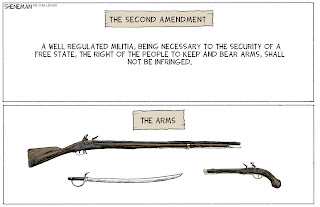The advocates of unrestricted ownership and access to guns have focused on the phrase "shall not be infringed" - but what about "well regulated"?
If we want to go the route of textualists and originalists, the phrase "well regulated" referred, not to government regulation, but to the preparedness and readiness to fight of the militia. One might think that this obviates the view that government has no role in regulating according to the modern definition of the word. First, a little background about militias,
At the time that the Constitution was written, there was an antipathy toward the idea of a standing army. A permanent army was viewed not as a force to defend, but as an instrument of aggression, and not unrelatedly, a drain on revenue. Armies were expensive. Professional soldiers were not viewed as honorable defenders of the nation, but looked down upon - "What? you can't find a real job?". A militia, on the other hand, was conceived as a group of citizens that could be called up as needed to defend the security of a free state. Militias existed to defend the community, not to defend the individual, and certainly not to defend against one's own government.
So, the founders envisioned a militia as the primary mode of providing "security for a free state", and wanted that militia to be well regulated, i.e. well prepared and presumably well trained. Of course, one of the ways that the members of the militia were to be well prepared was to be familiar with firearms. Hence they needed to ensure that "the people" could legally own and use (aka bear) arms, the government sure wasn't going to supply guns to everyone!
Over the last 200 plus years the method by which we attend to the security of a free state has changed. No longer do we have citizen militias like we did in the 18th century. We have the National Guard, certainly, but the Guard has become for all intents and purposes an arm of the permanent military. Our national discomfort with a standing army no longer applies, and common defense is now the responsibility of the once feared permanent armed forces. The "well regulated militia" of the Second Amendment no longer exists; it might then be argued that the right to keep and bear arms therefore no longer exists. At the very least, it's clear that this right was a community right - "the people", not "every person". (Which, until the Heller decision is 2008, was the position of the courts)
I am not suggesting that every citizen be disarmed. What I am suggesting is that the narrow beam focus on infringement is wrong. The circumstances under which the amendment was conceived no longer exist and the strict interpretation does not apply.


No comments:
Post a Comment